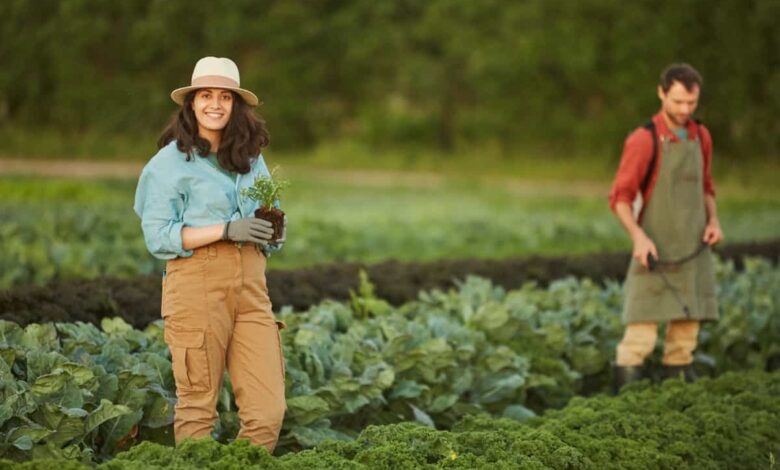
Are you also a person who has recently switched to healthy eating and you are an organic fruits and vegetables consumer, or are you planning to switch? Today, this comprehensive guide will help you learn all about natural vegetable farming in India. Natural vegetable farming is a method of farming where synthetic fertilisers or pesticides are not put into the farm to produce the harvest.
Organic farming focuses on maintaining the soil’s health and promoting biodiversity. With the increasing demand for healthy eating, natural vegetable farming is not just a trend but a movement. It’s gaining popularity in India, and you can be a part of this growing community that values health and sustainability. Let’s learn more about it :
Steps to Consider Before Natural Vegetable Farming
Before Beginning Natural Vegetable farming, it is important to consider a few steps to produce good-quality produce. Let’s see what steps we should consider.
Site Selection: Always choose a suitable site with proper sunlight and access to irrigation for natural vegetable farming. Plan the sowing after doing climate, soil, and market research.
Soil Health: Testing the soil is important to know its need for nutrients. Also, tilling of soil is important to mix the organic compost thoroughly to enhance the fertility of the farm. Power tillers are helpful in tilling the soil, mixing the manure, etc. If you are a big farm owner, then power tillers can be useful. Check out the power tiller prices in the market from different brands and compare them before purchasing.
Seed Selection: Select organic seeds that are good according to the region’s climate and soil conditions.
Irrigation: Implementing efficient irrigation systems like drip irrigation to save water and help in conserving biodiversity.
Essentials of Natural Vegetable Farming
Why is natural vegetable farming important? Did you ever think about it? There are many ways in which natural vegetable farming contributes, like maintaining a healthy diet and contributing to the ecosystem. Let’s learn more about it :
Soil Preparation: Healthy soil is a basic and vital factor to consider while doing natural farming. Crop rotation and cover cropping practices help enhance soil fertility and promote healthy plant growth.
Biodiversity: Encourgaing a diverse ecosystem within the farms helps farms in pest control and improves soil health. Practising crop Rotation or interoperating helps in maintaining soil health.
Water Conservation: Proper water management is essential in natural farming. It helps in water conservation. Drip Irrigation, or IPM, is an effective way of irrigation to conserve water.
Natural Weed Management: Mulching is used to control weeds naturally on farms. However, large farms that are organically farming use Power Weeder to remove unwanted weeds from the fields efficiently.
Benefits of Natural Vegetable Farming
In 2024, organic and natural living will be the new way of life. People will spend money on Organic products to maintain a healthy lifestyle. So, let’s see how natural vegetable farming benefits consumers and producers as well.
Healthy Produce: Natural farming methods help produce vegetables that are free of harmful chemicals and provide more nutritious food for consumers.
Economic Benefits: In this era, where people are opting for healthier ways of living, natural vegetable farm products are getting better prices in the market than traditional farming products.
Sustainable: It reduces soil pollution and helps in water conservation by avoiding the use of inorganic manure or fertilisers and by not using excessive water logging, respectively.
Climate Durability: Natural farming practices improve soil health, enhancing farms’ durability to climate change.
Challenges and Solutions in Natural Vegetable Farming
Natural or organic vegetables are in demand. However, natural vegetable farming faces a lot of challenges. But there are solutions as well. Let’s learn about challenges and their solutions as well.
Transition: Switching from traditional to natural farming can be a challenge, but gradually, with a proper plan, it is beneficial for farm owners. Organic or natural produce is more in
Demand and supply in the market are lower. So, it can be good for farmers from an economic
Perspective.
Pest and Diseases Management: It is hard to control pests without using synthetic
Chemicals. Using methods like IPM can be effective in managing pests.
Market Access: Finding a market for natural produce can be a challenge for farmers. The solution is to engage with local farmers’ markets’ CSA programmes and get organic certification to reach the right customers.
Awareness and Training: Lack of awareness about natural vegetable farming and market
Access can be a barrier. But with the help of proper training programmes, workshops, and
Networking can help farmers learn more about natural farming practices.
Conclusion
Natural Vegetable Farming offers a sustainable approach to farming. By focusing on soil health, biodiversity and natural pest control methods, farmers can produce high-quality harvests. It helps the environment and enhances farm quality.
Though there are many challenges, in the long term, if we see there are benefits for the health of consumers, farms can flourish more and help maintain biodiversity as well.
So, with the right farming techniques and a growing consumer demand for natural produce, the future of Natural vegetable farming is bright. It has the potential to not only provide healthier food options but also significantly contribute to our Agricultural economy.



